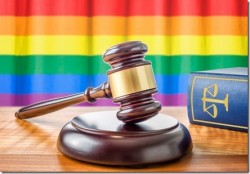While many cities and states have become more welcoming of LGBT individuals over the years, there are still some places where lawmakers haven’t provided any protections for these people. Some, such as Texas, have actively worked to pass laws that restrict LGBT people. For example, Texas recently passed a law that allows child welfare organizations to refuse couples based on religious beliefs. But how rare is this? These numbers will help shed light onto the current LGBT situation in mid-2017.
Differences in States and Cities
 First, it’s important to note that even when one state has a specific law regarding LGBT individuals, some cities within that state may actually offer many protections and be very welcoming. You do need to do some research before deciding where you’re going to move. Gay and lesbian real estate agents can help you learn more about any potential place to live.
First, it’s important to note that even when one state has a specific law regarding LGBT individuals, some cities within that state may actually offer many protections and be very welcoming. You do need to do some research before deciding where you’re going to move. Gay and lesbian real estate agents can help you learn more about any potential place to live.
Pro-LGBT Verses Anti-LGBT
When you compare states that have laws protecting the LGBT community verses those that don’t, it can be difficult to tell exactly how many are pro and how many are con. That’s because some have laws protecting things such as housing and employment, while others may have laws protecting adoption and employee benefits. Some states may even have laws, such as the one in Texas, that allows adoption agencies to discriminate, but then turn around and have strong hate crime laws.
However, overall, you can say that the states on the west coast and those in the northeast tend to have more protective laws than those in the south and Midwest, which tend to have more anti-LGBT laws in place. This isn’t always true, but it is something to keep in mind.
Hate Crime Laws
When it comes to hate crime laws, the Human Rights Campaign lists 20 states that do not have hate crime laws that specifically protect the LGBT community. Again, these are mainly in the south, but a cluster of states in the northern part of the state, including Montana, North Dakota, and Idaho, also do not have hate crime laws that address the LGBT community. Then there’s Texas and Tennessee, both of which most people would consider as more conservative, which do.
Discrimination
There are 29 different states with no laws preventing establishments from engaging in discrimination. The establishments in these states are free to refuse service to LGBT individuals. In 28 states, there are no protections for employment, meaning LGBT workers can be fired simply because of their sexual or gender preference.
